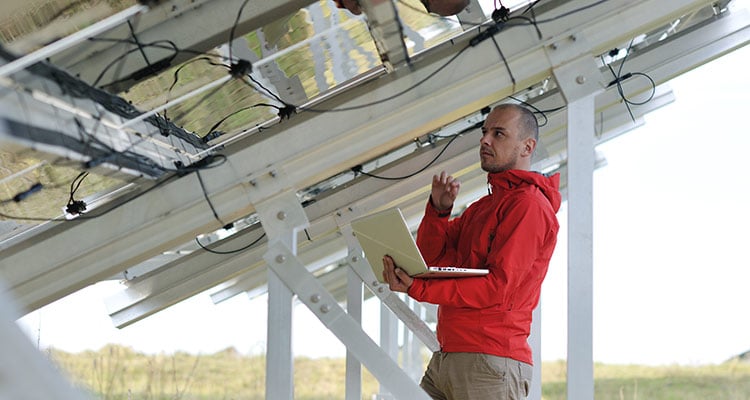The most useful services for buying a PV system
The increase in the number of existing commercial PV plant helped to develop a lively secondary market where existing plants can be traded. For a successful and professional handling of such sales of running plants, two things are particularly important: a structured approach, as well as sufficient transparency about the condition of the plant and the process of the transaction. Together, this makes it much easier for both parties to agree on a purchase price and to complete the sale within a reasonable time.
Of a particular importance hereby is the question of where to involve additional service providers in order to gain clarity about the condition of a plant that should be bought. While experienced buyers who have the necessary know-how can take over individual steps themselves and thus save time and money, it is advisable for less experienced buyers, on the other hand, to call in external expertise at an early stage. In the following, we will explain which factors are of particular importance for the purchase of existing plants and which service providers can be contacted for this purpose.
Buying a running PV plant: transparency, hedging and documentation
For buyers, the primary goal is to be as well informed as possible about the actual condition and possible risks of the PV plant they are interested in. The higher the level of transparency, the easier it is to estimate the actual price of a plant. For this purpose, it is particularly important to check the technical condition of the plant as well as possible legal risks that could be associated with the purchase. For both tasks, specialized service providers offer tailor-made “due diligence” reviews.
Technical due diligence (TDD): Technical due diligence involves comparing the past performance of the plant with its theoretical performance (“performance ratio”). The goal here is to obtain an accurate picture of the current condition of the PV-project. This includes a check whether the required maintenance of the plant has been carried out correctly; any defects found can be quickly and reliably identified, independently documented, and reported to the seller. For existing plants, a TDD usually also includes a physical inspection of the plant on site, where visible damages and other factors, such as the degree of contamination, can also be determined.
Legal due diligence (JDD): As part of the legal due diligence, the legal risks are determined and evaluated – analogously to the TDD. This concerns, for example, possible risks from existing contracts (usage contract, urban development contracts, grid connection contracts, etc.).
On the basis of the identified risks, the final report of a due diligence review contains a concrete recommendation for or against the acquisition of the property. It is therefore strongly recommended that both due diligence reviews be carried out as part of an asset acquisition. It is possible to book individual service packages tailored to an individual plant. Standard prices that help to keep the costs within an economically reasonable range exist especially for plants up to 750 kWp. Additionally, another advantage is that if a decision is ultimately made to purchase the PV plant, the legal service partner can provide very efficient support in drawing up or reviewing the corresponding purchase agreement on the basis of the review that has already taken place.
Project evaluation: Determining a purchase price in line with the current market is not trivial, even after knowing about the technical and legal risks of a PV project. While the buyer wants to achieve the lowest possible price, the seller aims for the highest possible revenue. A number of free tools, such as the Milk the Sun’s Net Worth Calculator, can help to calculate the market value of a plant using standardized parameters. A more detailed analysis can be delivered by other specific project valuation tools. Here, the individual project specifics are weighted more specifically, which means that the fair market value of the plant is determined even more accurately. Both types of project valuation support the argumentation and strengthen the negotiating position of the buyer vis-à-vis the seller.
Financing: Buyers need to find a way to finance the purchase of the new PV plant. In the usual scenario, where external capital – or loans – are required, it is recommended to tackle this question as early as possible, as the review process at a bank is expected to take at least six to eight weeks. Unlike in the case of new turnkey plants, the often favorable loans of the state-owned Förderbank KfW, are not available for financing existing plants. It is therefore particularly important to know the right financing partners. This can either be provided by the company’s own bank, or by financial institutions with a specialization in commercial-sized PV projects. House banks can offer attractive conditions when the personal creditworthiness of the buyer is stable enough – financing here is often only possible in the form of a personal loan. Larger PV projects, however, are usually financed through project financing. At this point, financial institutions that specialize in financing renewable energy projects are the right partner to contact.
The banks require extensive and complete documentation on the corresponding PV project for the processing of a credit request. This in particular can lead to an additional delay, especially if the buyer and/or seller have little experience in such transactions, or if the project documentation has not been properly documented. As both, the legal and technical due diligence, place special emphasis on the completeness of the documents, they perform important preliminary work in this regard.
This shows how essential it is to call in suitable services to ensure that all relevant information on a PV plant is available in a transparent manner and that the buyer and seller can agree on a purchase price on this basis. This can also be supported by the preparation of external project evaluations, which enable an independent price determination of a PV system.
In this context, the selection of the right service provider plays an important role. Since there are a number of service providers in the PV sector, it makes sense to obtain various offers and compare them with each other. Requests for all relevant transaction-related services can be made on the Milk the Sun Marketplace. These are forwarded to suitable service partners so that customers can select the most attractive offer and get in touch with the contacts at short notice.
Christian Schäfer, Business Development Manager at Milk the Sun





